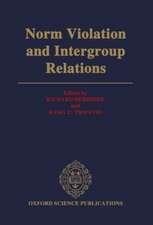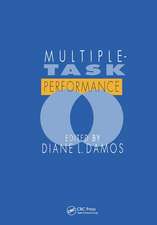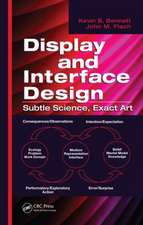Control Theory for Humans: Quantitative Approaches To Modeling Performance
Autor Richard J. Jagacinski, John M. Flachen Limba Engleză Hardback – oct 2002
Topics include varieties of control theory, such as classical, optimal, fuzzy, adaptive, and learning control, as well as perception and decision making in dynamic contexts. The authors also discuss implications of control theory for how experiments can be conducted in the behavioral sciences. In each of these areas they have provided brief essays intended to convey key concepts that enable the reader to more easily pursue additional readings. Behavioral scientists teaching control courses will be very interested in this book.
| Toate formatele și edițiile | Preț | Express |
|---|---|---|
| Paperback (1) | 498.29 lei 43-57 zile | |
| CRC Press – oct 2002 | 498.29 lei 43-57 zile | |
| Hardback (1) | 1123.37 lei 43-57 zile | |
| CRC Press – oct 2002 | 1123.37 lei 43-57 zile |
Preț: 1123.37 lei
Preț vechi: 1369.97 lei
-18% Nou
Puncte Express: 1685
Preț estimativ în valută:
214.99€ • 223.62$ • 177.48£
214.99€ • 223.62$ • 177.48£
Carte tipărită la comandă
Livrare economică 14-28 aprilie
Preluare comenzi: 021 569.72.76
Specificații
ISBN-13: 9780805822922
ISBN-10: 0805822925
Pagini: 394
Dimensiuni: 174 x 246 x 27 mm
Greutate: 0.86 kg
Ediția:1
Editura: CRC Press
Colecția CRC Press
ISBN-10: 0805822925
Pagini: 394
Dimensiuni: 174 x 246 x 27 mm
Greutate: 0.86 kg
Ediția:1
Editura: CRC Press
Colecția CRC Press
Public țintă
Academic, Professional, and Professional Practice & DevelopmentCuprins
Contents: Preface. Perception/Action: A Systems Approach. Closing the Loop. Information Theory and Fitts' Law. The Step Response: First-Order Lag. Linear Systems: Block Diagrams and Laplace Transforms. The Step Response: Second-Order System. Nonproportional Control. Interactions Between Information and Dynamic Constraints. Order of Control. Tracking. There Must Be 50 Ways to See a Sine Wave. A Qualitative Look at Fourier Analysis. The Frequency Domain: Bode Analysis. The Frequency Domain: Describing the Human Operator. Additional Adaptive Aspects of the Crossover Model. Driving Around in Circles. Continuous Tracking: Optimal Control. Estimating and Predicting the State of a Dynamic System With Lag-Like Calculations. Varieties of Variability. Lifting a Glass of Juice. Sine Wave Tracking Is Predictably Attractive. Going With the Flow: An Optical Basis for the Control of Locomotion. Fuzzy Approaches to Vehicular Control. Learning to Control Difficult Systems: Neural Nets. Some Parallels Between Decision Making and Manual Control. Designing Experiments With Control Theory in Mind. Adaptation and Design. Appendix: Interactive Demonstrations.
Notă biografică
Richard J Jagacinski, John M. Flach
Recenzii
"This long-awaited book provides a welcome--even essential--addition to every human factors professional's bookshelf....Indeed, the text makes a cogent case for the study and application of control theory in numerous facets of the human factors discipline....The two attributes that best describe the book are clarity and comprehensiveness. It is quite evident that the authors have succeeded in reaching their self-expressed goal for this work; that is, making the control theory accessible to a broad audience."
—Theoretical Issues in Ergonomics Science
"Throughout, one finds insightful commentary on applications of control theory to systems design and cognitive science research. If the value of a book comes from learning something new and fueling the imagination, this one should be required reading."
—Ergonomics in Design
"The text provides a solid introduction to the subject of manual control. Perhaps more importantly, the authors attempt to integrate control-theoretic descriptions with those derived from the field of experimental psychology. In doing so, they have provided a distinct service to the community of students and researchers working in the field of human/machine interaction. The text would be of definite value and interest to students in a wide variety of engineering disciplines."
—International Journal of Robust and Nonlinear Control
—Theoretical Issues in Ergonomics Science
"Throughout, one finds insightful commentary on applications of control theory to systems design and cognitive science research. If the value of a book comes from learning something new and fueling the imagination, this one should be required reading."
—Ergonomics in Design
"The text provides a solid introduction to the subject of manual control. Perhaps more importantly, the authors attempt to integrate control-theoretic descriptions with those derived from the field of experimental psychology. In doing so, they have provided a distinct service to the community of students and researchers working in the field of human/machine interaction. The text would be of definite value and interest to students in a wide variety of engineering disciplines."
—International Journal of Robust and Nonlinear Control
Descriere
Control Theory is a standard course taken by engineers. This book, from the psychological point of view, looks at manual control. The authors ask students to imagine themselves as part of the manual control system to better learn theconcepts of the field



















